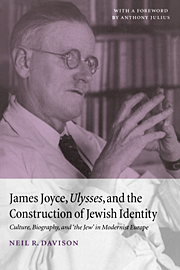 James Joyce, Ulysses, and the Construction of Jewish Identity
James Joyce, Ulysses, and the Construction of Jewish Identity Book contents
- Frontmatter
- Contents
- Foreword by Anthony Julius
- Acknowledgements
- List of abbreviations
- Introduction
- 1 Silence: family values
- 2 Silence: Jesuit years – Clongowes and Belvedere
- 3 Silence: university years – the Church, Dreyfus, and aesthetics
- 4 Exile: excursion to the Continent, bitter return
- 5 Cunning and exile: Greeks and Jews
- 6 Cunning: Jews and the Continent – texts and subtexts
- 7 Cunning: the miracle of Lazarus times two – Joyce and Italo Svevo
- 8 Ulysses
- Conclusion
- Notes
- Select bibliography
- Index
6 - Cunning: Jews and the Continent – texts and subtexts
Published online by Cambridge University Press: 05 April 2012
- Frontmatter
- Contents
- Foreword by Anthony Julius
- Acknowledgements
- List of abbreviations
- Introduction
- 1 Silence: family values
- 2 Silence: Jesuit years – Clongowes and Belvedere
- 3 Silence: university years – the Church, Dreyfus, and aesthetics
- 4 Exile: excursion to the Continent, bitter return
- 5 Cunning and exile: Greeks and Jews
- 6 Cunning: Jews and the Continent – texts and subtexts
- 7 Cunning: the miracle of Lazarus times two – Joyce and Italo Svevo
- 8 Ulysses
- Conclusion
- Notes
- Select bibliography
- Index
Summary
Joyce's years in Trieste and Zurich have long been suggested as the beginning of his interest in Judaism, Jewish identity, and the Jewish question. As I have demonstrated here, however, this is a narrow view of a broad field of investigation. The oversight may stem in part from the tangential treatment of the subject found in Richard Ellmann's biography. Because Joyce's expatriate years represent his direct involvement with Jews, however, Ellmann was within reason to explore Joyce's interest in “Jewishness” only after his arrival in Trieste. And yet, as I have illustrated through the many discourses about “the Jew” present in Joyce's imagination since childhood, “Ellmann's Joyce” is certainly not the final word on the subject. But life on the Continent did alter Joyce's attitude toward “the Jew” in significant ways. Indeed, his first ten years there represent a desultory and then a very deliberate quest for a well-rounded knowledge about European Jewry, Judaism, and racialist representations of “the Jew.”
Joyce's new awareness began with the city of Trieste itself. The life of the town was influenced by a Jewish intelligentsia whose presence was incomparably greater than that of the Jews of Joyce's native Dublin. The relationships he established in his new home offered him an intimacy with several European Jews who had each forged his or her own idiosyncratic assimilated identity. Through these individuals, Joyce came to understand better the nature and spuriousness of stereotypes of “the Jew” he had absorbed to that point. As his awareness of Jewish marginality and assimilation grew, he perceived parallels between the devalued roles played by both the Jews and the Irish in the development of Europe. His new friends in turn became convenient sources of such information.
- Type
- Chapter
- Information
- James Joyce, Ulysses, and the Construction of Jewish IdentityCulture, Biography, and 'the Jew' in Modernist Europe, pp. 127 - 154Publisher: Cambridge University PressPrint publication year: 1996


